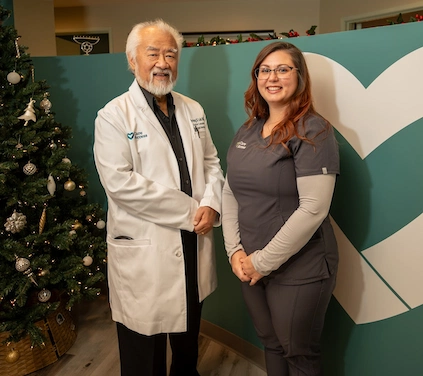
Lp(a), a lesser known cholesterol, could be increasing your risk of heart attack 3x. A free Lp(a) test can provide you valuable insight into your heart attack risk. See if you're eligible.
1 in 5 have high Lp(a)—and don’t know it
Elevated Lp(a) increases risk of stroke by 60%
90% of doctors don’t regularly check Lp(a).

Choose your location, tell us a little about you, and book your appointment.
Visit the selected site for your blood draw. You'll also receive a $45 stipend for your time and travel.
A few weeks after your test, our team will share your results, explain what they mean, and provide a copy for your doctor.
A genetically determined type of cholesterol that puts you at greater risk of heart disease
An ongoing elevation of the sugar in your blood that negatively impacts your heart, blood vessels, kidneys, nerves, eyesight and more.
How well your kidneys are filtering out waste and keeping your body in balance.
Measures cholesterol and fats in your blood.
A high sensitivity protein that, if chronically elevated, can be associated with heart disease risk.
A protein that may measure your risk for developing Alzheimer's disease (Based on eligibility at select locations).
I had a positive experience. The technician who took my blood was nice and professional. The representative explained my test results and went in detailed what the results meant. In addition, she was eager to answer my questions.
Great, fast and friendly service. The lady who assisted me and drew my blood did an amazing job. Did not feel any pain or discomfort. Would recommend.
I had great experience! My nurse was knowledgeable and professional and the entire process was quick and easy.
I am a serious hard stick but the phlebotomist there got me first try! I was crazy impressed.
Beautiful facility, great team and very organized research clinic.


Care Access works around the world to make the future of health better for all. We help people learn more about their health, access health resources they need, and participate in research to help find new medicines and cures.
Each person may only complete this blood test once, unless otherwise invited by Care Access.
Your ability to speak or read English or Spanish is required to complete your health screening appointment, to ensure your understanding of the potential risks of having blood drawn and your rights as a participant in research.
All participants must be 18 or older at the time of signing informed consent.
If you provide a specific sample storage consent, Care Access may save a small amount of blood from your screening to support future health research. Your sample will be labeled with a code (no personal information) and may be used to help researchers learn more about health and disease. This is completely optional.
20% of the world's population has an elevated lipoprotein (a) [Lp(a)], a very sticky protein (cholesterol) in your blood that is affected by genetics instead of lifestyle. A lipoprotein (a) test can help determine your Lp(a) levels, however, it is typically not covered by insurance.
Currently, there are no approved Lp(a) treatments on the market. Participants who screen will have access to learn about research options for the development of Lp(a) treatments.
Type 2 diabetes is diagnosed when your pancreas cannot create the hormone insulin that helps lower the amount of glucose (sugar) in your blood.